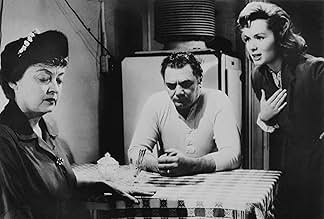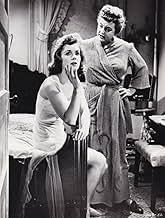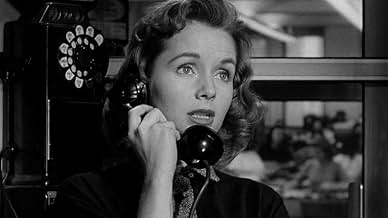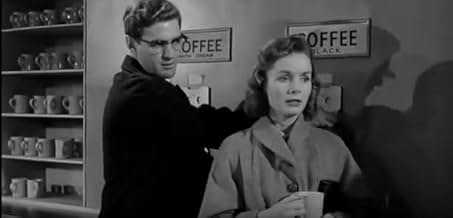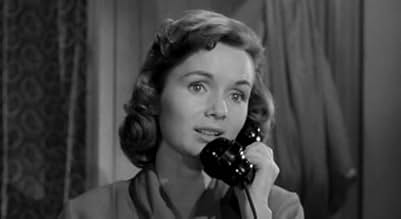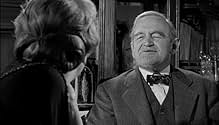Jane Hurley comunica a sus padres Tom y Agnes que va a casarse con Ralph Halloran, Agnes empieza a planear una gran boda, a pesar de que Jane y Ralph no la desean y Tom no puede permitírsela... Leer todoJane Hurley comunica a sus padres Tom y Agnes que va a casarse con Ralph Halloran, Agnes empieza a planear una gran boda, a pesar de que Jane y Ralph no la desean y Tom no puede permitírsela.Jane Hurley comunica a sus padres Tom y Agnes que va a casarse con Ralph Halloran, Agnes empieza a planear una gran boda, a pesar de que Jane y Ralph no la desean y Tom no puede permitírsela.
- Dirección
- Guionistas
- Elenco
- Premios
- 2 premios ganados en total
Robert F. Simon
- Mr. Joe Halloran
- (as Robert Simon)
Joan Bradshaw
- Girl on Phone
- (sin créditos)
Janice Carroll
- Mrs. Casey's Daughter-in-law
- (sin créditos)
Mae Clarke
- Saleswoman
- (sin créditos)
- Dirección
- Guionistas
- Todo el elenco y el equipo
- Producción, taquilla y más en IMDbPro
Opiniones destacadas
I had seen this movie mentioned here and there for years, but neither the title nor the cast list suggested to me that I would enjoy it. (Ive never been that big a fan of either Ernest Borgnine or Bette Davis, although I knew they were fine actors; and putting sweet young Debbie Reynolds in the same scenes with them did not seem promising.) Finally someone whose taste I respected recommended it, so I gave it a try. What a delight! A subtle, intelligent script, with a cast that absolutely did it justice. None of the characters are perfect; none are terrible; and above all, none are simple. What is remarkable to me is the complexity and depth of the characters that is revealed without any one of them ever explaining him- or herself any more articulately than real people do. It took fine writing (Chayevsky may have done this better than anyone else), fine directing, and fine acting all around to accomplish this. Somehow it escapes being distinctly melodramatic, "gritty," bleak, or even particularly sentimental - while at the same time avoiding being too light, or too witty. It is just eminently watchable.
Paddy Chayefsky wrote this second ode to the Bronx to follow up what he had received in acclaim from Marty. Though The Catered Affair did not win all the awards that Marty did, it certainly is a well done film with a lot of merit on its own.
The Jewish Chayefsky certainly was a good observer of the other cultures where he grew up. Marty was about an Italian butcher who starts to find romance late in his life. The Catered Affair is about a young Irish couple getting married and the effect a big wedding is having on the family finances and structure.
Ernest Borgnine switches quite easily from working class Bronx Italian to working class Bronx Irish. He barely makes enough to support a wife, two surviving children and a brother-in-law, Barry Fitzgerald who lives with them. One son was killed during World War II.
Bette Davis was at her most drab on the screen, but that's not to say she was not great. Richard Brooks put a tight rein on all her Betteisms and got a fabulous performance out of her as the Bronx housewife who wants to live vicariously through a big wedding for daughter Debbie Reynolds. It's been a hard life for her and the family and she wants a little glamor in it.
Rod Taylor and Debbie Reynolds are an appealing young couple and Robert F. Simon and Madge Kennedy do fine as Taylor's parents. The best part of A Catered Affair is Barry Fitzgerald and Dorothy Stickney as the woman who woos him away from free loading on his sister. Davis and Borgnine certainly had a challenge just to keep the whole picture from being stolen by Barry Fitzgerald in what was really his last great part.
A few people have compared The Catered Affair with Father of the Bride and the problems that upper middle class lawyer Spencer Tracy faces as compared to lower middle class cab driver Ernest Borgnine faces in giving their daughters an expensive wedding. It's that other Bronx family of the same era, the fabulous and illegally rich Corleones that beggars comparison. I look at that wedding scene that from The Godfather and the lavishness that was bestowed on Talia Shire's wedding and who wouldn't want a wedding like that. But I have a feeling that Reynolds and Taylor will make it last, a lot more than the much married Connie Corleone did.
I did so like looking at the Bronx in the Fifties where at least some establishing shots were done. The first time I was in the Bronx was for my first Yankee game. It's changed a lot now, but a place like Morris Park for the Italians and Woodlawn for the Irish still has the flavor of the areas where the Hurleys and Hallorans of The Catered Affair and the Pilettis from Marty lived and worked.
And if you like seeing the New York of your childhood, The Catered Affair is a film to enjoy.
The Jewish Chayefsky certainly was a good observer of the other cultures where he grew up. Marty was about an Italian butcher who starts to find romance late in his life. The Catered Affair is about a young Irish couple getting married and the effect a big wedding is having on the family finances and structure.
Ernest Borgnine switches quite easily from working class Bronx Italian to working class Bronx Irish. He barely makes enough to support a wife, two surviving children and a brother-in-law, Barry Fitzgerald who lives with them. One son was killed during World War II.
Bette Davis was at her most drab on the screen, but that's not to say she was not great. Richard Brooks put a tight rein on all her Betteisms and got a fabulous performance out of her as the Bronx housewife who wants to live vicariously through a big wedding for daughter Debbie Reynolds. It's been a hard life for her and the family and she wants a little glamor in it.
Rod Taylor and Debbie Reynolds are an appealing young couple and Robert F. Simon and Madge Kennedy do fine as Taylor's parents. The best part of A Catered Affair is Barry Fitzgerald and Dorothy Stickney as the woman who woos him away from free loading on his sister. Davis and Borgnine certainly had a challenge just to keep the whole picture from being stolen by Barry Fitzgerald in what was really his last great part.
A few people have compared The Catered Affair with Father of the Bride and the problems that upper middle class lawyer Spencer Tracy faces as compared to lower middle class cab driver Ernest Borgnine faces in giving their daughters an expensive wedding. It's that other Bronx family of the same era, the fabulous and illegally rich Corleones that beggars comparison. I look at that wedding scene that from The Godfather and the lavishness that was bestowed on Talia Shire's wedding and who wouldn't want a wedding like that. But I have a feeling that Reynolds and Taylor will make it last, a lot more than the much married Connie Corleone did.
I did so like looking at the Bronx in the Fifties where at least some establishing shots were done. The first time I was in the Bronx was for my first Yankee game. It's changed a lot now, but a place like Morris Park for the Italians and Woodlawn for the Irish still has the flavor of the areas where the Hurleys and Hallorans of The Catered Affair and the Pilettis from Marty lived and worked.
And if you like seeing the New York of your childhood, The Catered Affair is a film to enjoy.
I enjoyed this movie very much. It seems like it was originally done as a television drama and ended up being released theatrically. The cast, screenwriter and director are all top of the line and they all did very good work in this little seen movie. I believed in each character and the drama is not overdone at all.
This delightful production is full of life; a vignette which cuts deep to reveal the quiet despair, sullen defeat, and ultimate triumph of a marriage which had always looked back at its shameful beginning, but finally is freed to discover itself anew.
Davis' mastery of the Brooklyn tone and colloquialisms is uncanny. Her "Aggie" is real, and sympathetic, if not admirable. Her pain from the awakening knowledge of having only lived with, but not shared life with her daughter and husband touches us where it hurts. The fix of manipulating a "big" (but unaffordable) wedding for her daughter falls flat, forcing Aggie to grapple with the real issues of her life.
Her bachelor brother "Uncle Jack" (Barry Fitzgerald) is Aggie's counterpoint, full of Blarney, enjoying every moment to its fullest, as when he playfully informs delightful Mrs. Rafferty (his future bride) of her debt in their running game of Cannasta: $24,700.
Debbie Reynolds is lovely, earnest, in character and hard-hitting as Aggie's daughter Jane, sacrificing her own wishes, and torn between the conflicting needs of her mother and father.
Borgnine is the under-appreciated, self-sacrificing husband, giving up his long held dream of owning a taxicab if it would satisfy his wife, finally pleading his own case, and finding joy in his marriage.
A compelling story with excellent acting and staging.
Davis' mastery of the Brooklyn tone and colloquialisms is uncanny. Her "Aggie" is real, and sympathetic, if not admirable. Her pain from the awakening knowledge of having only lived with, but not shared life with her daughter and husband touches us where it hurts. The fix of manipulating a "big" (but unaffordable) wedding for her daughter falls flat, forcing Aggie to grapple with the real issues of her life.
Her bachelor brother "Uncle Jack" (Barry Fitzgerald) is Aggie's counterpoint, full of Blarney, enjoying every moment to its fullest, as when he playfully informs delightful Mrs. Rafferty (his future bride) of her debt in their running game of Cannasta: $24,700.
Debbie Reynolds is lovely, earnest, in character and hard-hitting as Aggie's daughter Jane, sacrificing her own wishes, and torn between the conflicting needs of her mother and father.
Borgnine is the under-appreciated, self-sacrificing husband, giving up his long held dream of owning a taxicab if it would satisfy his wife, finally pleading his own case, and finding joy in his marriage.
A compelling story with excellent acting and staging.
An unjustly neglected "kitchen sink" movie from the fifties, with fine performances by all and intriguing New York locations.
Bette Davis and Ernest Borgnine portray the very much working-class parents of a young woman who is about to get married, and just wants a quick ceremony with no reception. But the mother, guilty about "not giving her daughter anything" over the years, pushes for an expensive "catered affair" that her husband cannot afford, and would use money he planned to devote to buying a taxicab license.
Davis' brassy performance has received the most attention, but Borgnine's subtle, nuanced portrayal of the father is what really sustains this movie. Barry Fitzgerald provides comic relief as a "oirish" uncle. Altogether a charming and touching film that is very much a slice of life of NYC in the fifties. Like the other Chayefsky scripts of this era, it explores themes that would have been unpalatable or mawkish for any other writer.
Bette Davis and Ernest Borgnine portray the very much working-class parents of a young woman who is about to get married, and just wants a quick ceremony with no reception. But the mother, guilty about "not giving her daughter anything" over the years, pushes for an expensive "catered affair" that her husband cannot afford, and would use money he planned to devote to buying a taxicab license.
Davis' brassy performance has received the most attention, but Borgnine's subtle, nuanced portrayal of the father is what really sustains this movie. Barry Fitzgerald provides comic relief as a "oirish" uncle. Altogether a charming and touching film that is very much a slice of life of NYC in the fifties. Like the other Chayefsky scripts of this era, it explores themes that would have been unpalatable or mawkish for any other writer.
¿Sabías que…?
- TriviaCraggy-faced Ernest Borgnine was 39 when this film came out, only 15 years older than his film daughter Debbie Reynolds, who was 24. His wife in the film, Bette Davis, was 48.
- Errores(at around 30 mins) Ralph (Rod Taylor) and Jane (Debbie Reynolds) are sitting next to each other in front of the window. In the next moment, Uncle Jack (Barry Fitzgerald) then appears in the room, but now Ralph is sitting at the opposite end of the table away from Jane, and Uncle Jack takes the seat where Ralph had been.
- Citas
Agnes Hurley: You're going to have a big wedding whether you like it or not! And if you don't like it, you don't have to come!
- Versiones alternativasAlso shown in a computer colorized version.
- ConexionesFeatured in AFI Life Achievement Award: A Tribute to Bette Davis (1977)
- Bandas sonorasCailín Deas Crúite na mBó (A Pretty Girl Milking Her Cow)
Traditional 18th-century Irish ballad
Selecciones populares
Inicia sesión para calificar y agrega a la lista de videos para obtener recomendaciones personalizadas
- How long is The Catered Affair?Con tecnología de Alexa
Detalles
Taquilla
- Presupuesto
- USD 1,008,000 (estimado)
- Tiempo de ejecución
- 1h 34min(94 min)
- Color
- Relación de aspecto
- 1.85 : 1
Contribuir a esta página
Sugiere una edición o agrega el contenido que falta


